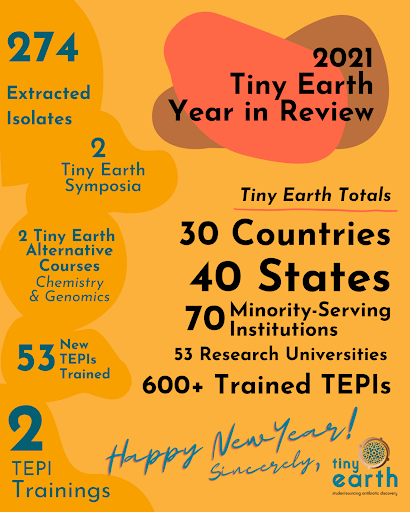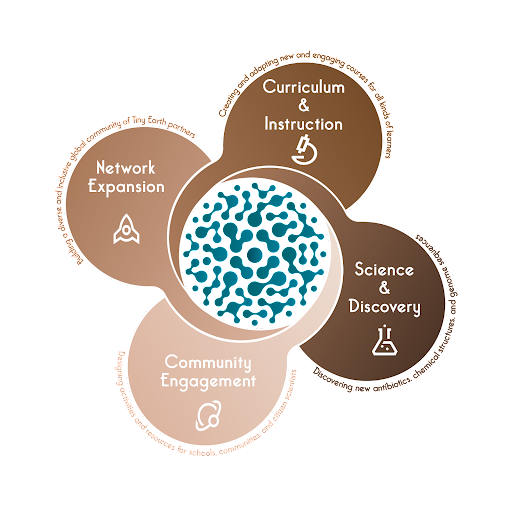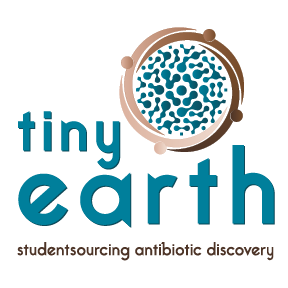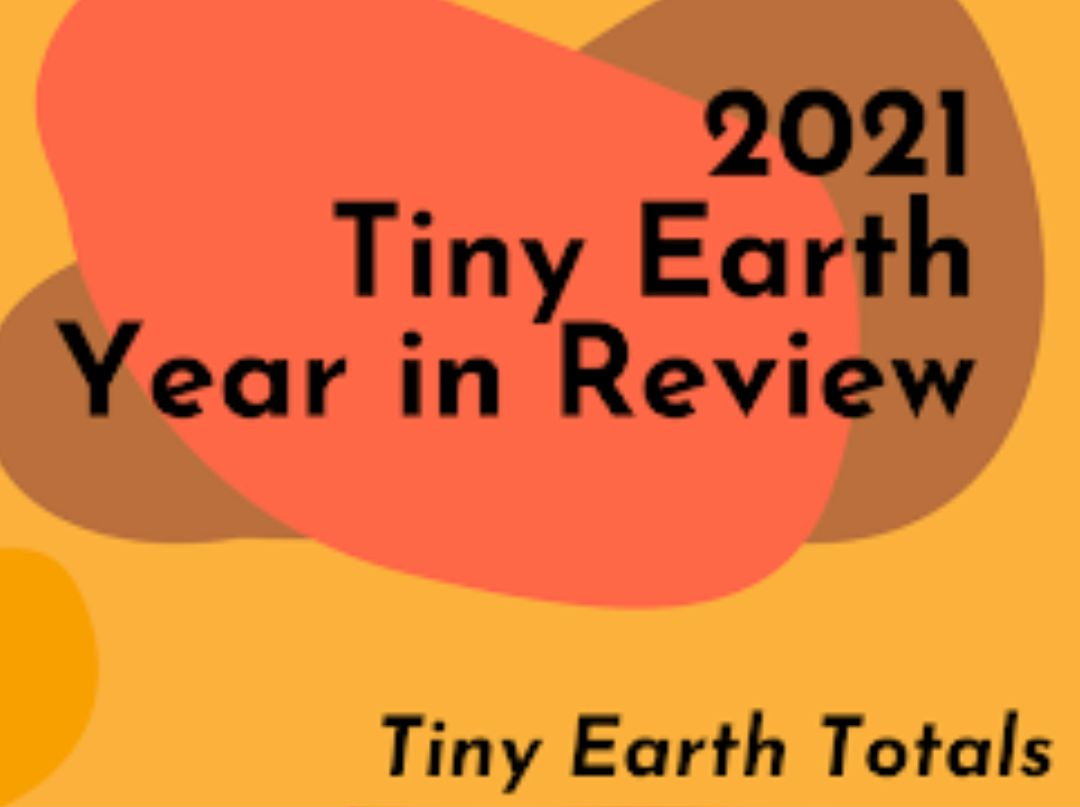Tiny Earth 2021 Year in Review
 For students and instructors around the world, it has been an exciting yet overwhelming semester pivoting between remote and face-to-face instruction. At the end of 2020, we found ourselves with great desire to bid adieu to a tumultuous year. As 2021 began, we re-evaluated the status of our world, attempted to get back on our feet, and got tangled in the “new normal.” Despite becoming experts of online learning, from organizing Zoom breakout rooms to leveraging TikTok for student engagement, we discovered new challenges as our classrooms reached full capacity once again, and we became acclimated to new physical boundaries during a pandemic. Many of us have simply blinked in surprise at the arrival of year’s end, while others have come to this moment breathing a sigh of relief. While bringing valuable learning experiences and hands-on research to the classroom, Tiny Earth Partner Instructors (TEPIs), the Tiny Earth team, and our Tiny Earth students have persevered through 2021’s daily challenges, adapted to the unpredictable, taken time to appreciate one another and our health, and accepted change with grace and kindness. Tiny Earth would like to take a moment to reflect on the trials of 2021 and highlight the great accomplishments achieved within our network.
For students and instructors around the world, it has been an exciting yet overwhelming semester pivoting between remote and face-to-face instruction. At the end of 2020, we found ourselves with great desire to bid adieu to a tumultuous year. As 2021 began, we re-evaluated the status of our world, attempted to get back on our feet, and got tangled in the “new normal.” Despite becoming experts of online learning, from organizing Zoom breakout rooms to leveraging TikTok for student engagement, we discovered new challenges as our classrooms reached full capacity once again, and we became acclimated to new physical boundaries during a pandemic. Many of us have simply blinked in surprise at the arrival of year’s end, while others have come to this moment breathing a sigh of relief. While bringing valuable learning experiences and hands-on research to the classroom, Tiny Earth Partner Instructors (TEPIs), the Tiny Earth team, and our Tiny Earth students have persevered through 2021’s daily challenges, adapted to the unpredictable, taken time to appreciate one another and our health, and accepted change with grace and kindness. Tiny Earth would like to take a moment to reflect on the trials of 2021 and highlight the great accomplishments achieved within our network.
Our network’s moving parts map onto four strategic priorities that organize our goals. In 2021, every area of those priorities was affected after a massive influx of Tiny Earth content, collaborative instructor working groups, and online events during 2020’s pivot to online learning: Curriculum & Instruction, Science & Discovery, Community Engagement, and Network Expansion. Tiny Earth headquarters developed and launched a comprehensive TEPI website to act as a one-stop shop for instructor resources, organized by these four strategic priorities. The TEPI website replaces the Instructor Resources page that will sunset at the end of 2021 (Request access – Instructors only | Review our TEPI website guide for more information). In addition to creating an instructor focused website, we gathered groups of motivated TEPIs to lead committees and subcommittees committed to developing Tiny Earth’s strategic priorities into tactical approaches and objectives (Join a committee).
Watch out for the launch of our new logo and website in 2022!
CURRICULUM & INSTRUCTION
Creating and adapting new and engaging courses for all kinds of learners | Contact: Enid González-Orta
As our network continues to grow, our curriculum evolves with it! Tiny Earth constantly works with our Tiny Earth Partner instructors (TEPIs) to bring exciting new classroom activities, modes of learning, and course content. In Fall of 2020 we launched the first Tiny Earth extension course: Tiny Earth Chemistry! Since then, a handful of existing and newly trained TEPIs to bring Tiny Chemistry to their classrooms. In addition to Tiny Earth Chemistry, the Tiny Earth Genomics working group has continued to create and adapt bioinformatics and metabolomic modules throughout 2021, in addition to a new bioprospecting module. Stay tuned for Tiny Earth Genomics modules coming next!
Through the COVID-19 pandemic, students and instructors needed more support in online learning than ever before. The pandemic affected scientists around the world, restricting access to labs and classrooms even after folks began to return to the public. We saw dependence on our loved ones for emotional and physical support and a growing desire for mentorship and connection online. The Tiny Earth network dove into these new learning experiences and adapted our curriculum to match the massive changes consuming our world. Our collaborators at University of California San Francisco and Texas A&M University assessed the impact of the effect of COVID-19 on TEPI mentoring and teaching and published their findings. Key findings from this study showed that instructors’ ability to work and conduct research was affected by COVID-19 in addition to increased barriers on mentorship. Moving forward, we anticipate that most TEPIs will have officially pivoted back to face-to-face instruction, while many others will continue to teach in hybrid or remote context and leverage what we’ve learned from the challenges of 2021. Watch for a TEPI-authored JMBE publication in 2022 about how Tiny Earth leveraged the TEPI community to pivot to online and develop antiracist curriculum!
 SCIENCE & DISCOVERY
SCIENCE & DISCOVERY
Discovering new antibiotics, chemical structures, and genome sequences | Contact: Nichole Broderick & Joanna Klein
This year, we planted the seeds for a new Science Committee to advise scientific activities and protocols for Tiny Earth led by Joanna Klein (University of Northwestern, St. Paul). This committee focuses on advising the Tiny Earth Chemistry Hub, reviewing and revising protocols in the student manual, and coordinating topic-focused subgroups.
In January 2021, Tiny Earth published a paper in mBio. Authored by several members of the Tiny Earth Chemistry Hub team, the Tiny Earth administrative team, and TEPIs, “Tiny Earth: A Big Idea for STEM Education and Antibiotic Discovery” details the importance of retaining diverse students in science, the global antibiotic resistance crisis, and how Tiny Earth aims to mitigate these problems through studentsourced research and discovery. This publication was a pivotal moment in sharing Tiny Earth’s goals with the public and gaining traction for collaboration and expansion of our curriculum.
On a tinier Science & Discovery scale, over 4,600 bacteria isolates were logged into the Tiny Earth Database in 2021. Several U.S. institutions have sent their logged isolates to The Tiny Earth Chemistry Hub (TECH) at the Wisconsin Institute for Discovery which maintains a collection of 2,500+ isolates that continue to grow every semester. TECH members have worked diligently every week to organize and track our collection, codify extraction, characterization, and analysis protocols, and train new TECH folks to continue processing and extracting isolates that will eventually make their way further into the drug discovery pipeline. This year alone, TECH has extracted and begun characterization of 274 bacteria isolates (Visit the TEPI website for info on submitting isolates to TECH and FAQs).
At the Tiny Earth Chemistry Hub, Tiny Earth piloted the Tiny Earth Summer Research Course that will bring two-year community college Tiny Earth students an opportunity to conduct research at high-level research facilities. We hope to eventually expand this program to students nationwide.
COMMUNITY ENGAGEMENT & EVENTS
Designing activities, resources, and events for schools, communities, and citizen scientists | Contact: Aarti Raja
Tiny Earth events were largely virtual in 2021. As always, we were joined by the Tiny Earth community, friends and family, and partners from around the world at our annual Tiny Earth Summer Symposium in June and Winter Symposium in early December. In June we held a 3-day virtual event, featuring diverse industry professionals, public health experts, veteran Tiny Earth student speakers to highlight antibiotic stewardship and student academic and career paths beyond Tiny Earth, and, of course, Tiny Earth student researchers. The one-day Winter Symposium focused on celebrating student research presentations and the release of Tiny Earth Founder Jo Handelsman’s new book, A World Without Soil (Watch the plenary session). Combined, our symposia brought together over 300 participants to showcase Tiny Earth students and their research, giving us opportunities to learn more about public health crises and how we can use scientific knowledge to combat emerging challenges.
In 2021, we coordinated a Workshop Committee to plan, organize, and host Tiny Earth Partner Instructor (TEPI) workshops. After holding a series of pivot-to-online workshops during the height of the COVID-19 pandemic, we discovered the value of giving instructors a space to network, collaborate, and ask questions with their colleagues from across institutions, while learning and sharing ideas for new teaching methods and course content. In 2021, we hosted 16 workshops and webinars, each with a distinct and valuable topic such as backward design workshop to develop Tiny Earth Genomics, leveraging electronic lab notebooks, and office hours for new TEPIs. We invited TEPIs from across the country to help plan and host workshops. We saw over 132 instructors, community partners, and guests in attendance during the fall semester workshop series alone!
NETWORK EXPANSION
Building a diverse and inclusive global community of Tiny Earth Partners | Contact: Sarah Miller & Debra Davis
To achieve Tiny Earth’s goals of inspiring diverse students to persist in science, mitigate the antibiotic resistance crisis, and protecting our life-abundant soils, our network strives to make our curriculum as available and accessible through low-stakes, high reward training for instructors all around the world. Since inception in 2012 when it was first taught as “Microbes to Molecules,” Tiny Earth has focused on ensuring that instructors are equipped with the resources to teach an engaging and inclusive Tiny Earth course. In 2021, we hosted 2 free, virtual training sessions. In January, we trained 20 instructors from 12 US states, Egypt, and Sweden. Last summer, we trained 33 instructors from 18 US states and South Africa. To further expand Tiny Earth’s capacity to bring undergraduate research experiences and curriculum access to more students and instructors, 6 TEPIs participated in our new Certified TEPI Trainer program to learn how to host the TEPI Training events.
Tiny Earth is committed to amplifying the power and voice of the Tiny Earth community beyond traditional scientific research to generate discussions surrounding principles of Anti-racism, Justice, Equity, Diversity, and Inclusion (AJEDI). Throughout 2021, we continued to solidify these principles throughout our curriculum, training, and community events. We made efforts this year to gather information on minority-serving institutions and community colleges to encourage instructors to bring undergraduate research experience to underserved communities. A team of Tiny Earth authors have been working on an AJEDI manuscript that will soon be published in 2022. As a preview, you can view the AJEDI TEPI workshop with the authors. Stay tuned for details.
THANK YOU!
None of this work would have been possible without the amazing network of TEPIs and all the Tiny Earthlings (students). Thank you all for your contributions of ideas, time, and kindness. Cheers to a bright and healthy 2022!
A special thank you to members of our Tiny Earth Committees & Subcommittees:
Nichole Broderick, Director of Science and Training
Debra Davis, Training Content Subcommittee Chair
Neil Enis, Application Review & Mentor Pairing Subcommittee Chair
Wayne Hatch, Application Review & Mentor Pairing Subcommittee Co-chair
Enid González-Orta, Curriculum Committee Chair & Tiny Earth Classic – Pivot to Online Committee Chair
Paul (Skip) Price, Tiny Earth Classic – Pivot to Online Committee Co-chair
Katherine Maloney, Tiny Earth Chemistry Course Committee Chair
Jordan Annalisa, Tiny Earth Chemistry Course Committee Co-chair
Kristin Labby, Tiny Earth Chemistry Course Committee Co-chair
Deb Tobiason, Tiny Earth Genomics Modules Committee Chair
Aarti Raja, Events Committee Chair, Symposium Committee Ex Oficio Chair
Heather Pelzel, Symposium Committee Co-chair, Summer Symposium Chair
Brian Merkel, Symposium Committee Co-chair, Winter Symposium Chair
Yvonne Sun, Workshop Committee Co-Chair
Patricia Rossi, Workshop Committee Co-chair
Joanna Klein, Science Committee Chair


